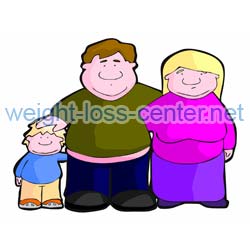I was watching a show on TV the other night about morbid obesity. The show delved into the lives of three people who are morbidly obese and are bed-ridden the majority of the time because of their condition. I found it to be a powerful show that gave me new insights into food addiction, emotional eating and what health conditions can manifest when morbid obesity occurs.

Some people end up helping the ones they love become overweight or obese because they are afraid of causing disappointment or anger.
I found that after the show I couldn’t stop thinking about these people I had just learned about, who for one reason or many, were unable to control the amount of food they ate. One of the things that intrigued me most about their situations was that all of these people were unable to get around much, yet they seemed to have an unending supply of food brought to them by either spouses, their children or their parents. Why would someone help another become overweight or morbidly obese knowing that it is harming the one they love?
I don’t think that there are many people who enjoy seeing someone they love suffer with a weight problem. And yet, there are more morbidly obese people today than there have ever been at any other time in society. This situation seems to point to the possibility that family members and friends of those who are obese are turning a blind eye to their weight gain, and may even be unintentionally helping them become obese. While this seems like a harsh accusation, the truth is that many people want to enable those they love – not because they don’t love them, but because they do love them.
Here are some common reasons why some people help others become overweight or obese:
Fear of Disappointment and Anger – One of the first things a person who is living with a morbidly obese person will say is that they continue to feed their food addiction because they don’t want to disappoint them, let them down or make them unhappy. Many of us have been taught that food is a way in which we can please others and by not helping another person have the food they want means that person might be disappointed and even angry.
What people need to remember is that their loved one is likely suffering from a very real addiction – food addiction. This can make them act in irrational and hurtful ways towards people around them just to get what they want and they feel they need, which is food. As with other types of addictions, family members and friends of these people can find themselves jumping through hoops to keep the person happy, even at the expense of their health. In most of these cases, professional help addressing the addiction should be sought for both the person who is overweight and their loved ones.
Unwilling to Make Diet Changes – In some cases, the people who are enabling a person to become morbidly obese do so because they are unwilling or unable to make change in the way they eat. Sometimes entire families can be struggling with obesity together and this can perpetuate bad habits, such as overeating, unhealthy food choices and a lack of exercise.
While not everyone may want to change the way they eat, supporting friends or family members who want or need to lose weight might be helpful for all involved. Part of being in a relationship is helping each other out. Thus, instead of looking at adjusting one’s eating habits as a chore, friends and family members may want to think about how not changing their eating habits are hurting the one they love.
Playing the Blame Game – A person who is enabling someone else to become or remain obese may place the blame of this predicament square on the other person’s shoulders. In saying that the other person should just be able to change they way they eat or just say “NO” to overeating, they are absolving themselves of any responsibility. If they’re keeping unhealthy food in the house and they are advocating unhealthy habits, such as not exercising or overeating, they are also to blame for the situation. While it’s true that there is personal responsibility to help one’s self, a person in a relationship can also help by being supportive in simple ways. This may include removing all unhealthy foods from the house or keeping a secret stash that you eat away from the other person, encouraging more activities the both of you can do together away from the TV, and preparing healthier, portion-controlled meals together.
Power and Control – I hate to think that there are people in this world who use obesity as a way to have power and control over someone else, but there are. Just as there are people who use drug and alcohol addictions of others to their own personal gain, there are also people who use food addiction in the same way. In many of these cases, the ones enabling obesity enjoy the feeling of power and control they have over the other person who relies on them entirely for food. This type of behavior is indicative of mental health problems for both people involved and therapy will likely be required in order to break the cycle.
As I wrote this blog post I kept reflecting on my own life and the habits that my husband and I do, often without even thinking. For example, when my husband is feeling unhappy, it is my first instinct to offer to go out and buy him something tasty. This usually involves a trip to the nearest burger joint for not one, but many hamburgers. And even though I know that this food is really not good for him and will just contribute to weight gain I still do it because I want him to feel happier.
The thing I’m beginning to realize as I write this is that it’s not necessarily the food that makes him happy, because if it was just that he’d go get it himself and never be blue. It’s the fact that I offer to do something nice for him, to care for him and show him that I love him that improves his mood the most. There are so many other things I can do for him other than buying him food and from this moment on I will try my best to explore what those other things can be.
Other Related Posts and Articles you May Find Interesting: “Overcoming Emotional Eating”, “Talking to Your Children About Weight Loss”, “Family Weight Loss” and “Is Fat Becoming the New Thin?”.





Nice article with good info…blogged about it as well. Sure is something for folks to look at. I would also suggest folks search online using “co-dependency” or “co-dependent” as some enabling may actually be a larger problem known in addiction circles and beyond as “co-dependency”. Hope this is helpful. Henry
I really like your way of thought as it highlights how obesity is a matter for the whole family, where everyone should understand their own role and address ways to change. As we are living in what scientist call and obsinogenic environment it might be more important than ever to rethink our social interactions to avoid that our loved ones will suffer the consequences of being overweight or even obese